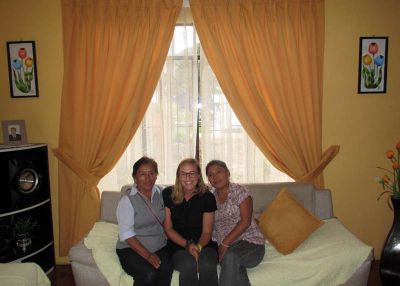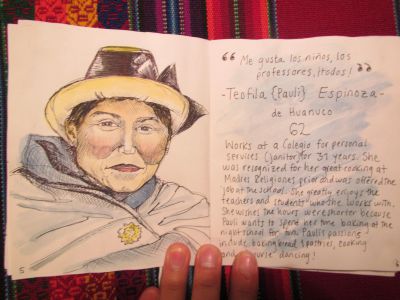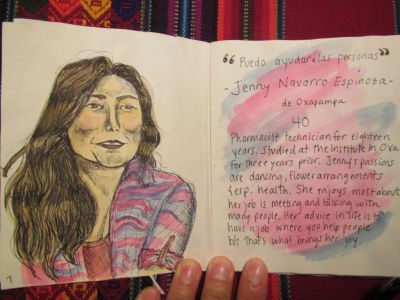Para Mí, Para Ti

Anna shares a journal entry on the phrase “Para mí, para ti,” or “For me, for you.” As part of her final research project, she interviewed women in Oxapampa, including her host mother, Teofila, known as “Pauli,” and her host sister, Jenny, and created a chapbook, complete with portraits.
Para mí, para ti.
It rings nicely. Together it rolls and rhymes and feels as if it’s always meant to be said together. As one thing. Is it one thing?
Do we give so that our hearts feel good — para mí.
Or do we give to make a child smile, a mother sigh with relief, a teacher feel less burdened by coloring sheets — para ti.
I buy keke plátano at the panaderia on the corner on my way home — para mí.
And I share it with Jenny my host sister when I meet her outside my door in the garden — para ti.

I draw the shiny plant in my sketchbook at the kitchen table — para mí — near to my host mom, Pauli, as she cooks lunch so she knows I appreciate her cooking and presence — para ti.
I read my books every day allowing myself to get lost in a different story — para mí — on the couch next to Jenny as she flips through TV channels and yells for Tome and Preciosa, her dogs, because I want her to know I enjoy her company and respect her love for the two wild puffs of animals she cares for, even though I can’t share that same love — para ti.
I swoosh color onto paper to create flower arrangements resembling the lush gardens around me to feel rejuvenated and feliz — para mí — and I give them as gifts for Jenny’s 40th birthday — para ti.
Is it para mí or para ti?
Or para ti, para mí?
Do we “do” for you or for me?
SST is supposedly from the outside, para ti. Service, volunteer, giving time and asking nothing in return. But it feels more like para mí.
How much of my presence is appreciated, wanted? Or am I a knot, extra space?
I find myself more a help as time goes by.

They have me draw murals for the kids to color to explain the geography of the community. I am helping. But how much?
SST is for me. Para mí, I decided. The teachers are experienced and have control of the class; my family here has a fulfilling life with parties and friends, errands, and favorite novelas to watch.
I am here para mí and para ti, or for them, an extra excitement, curiosity, an alien, mystery, a friend, an observer, a temporary daughter, a challenge, but a fun one.
Such an irony of SST.
Para mí or para ti?




